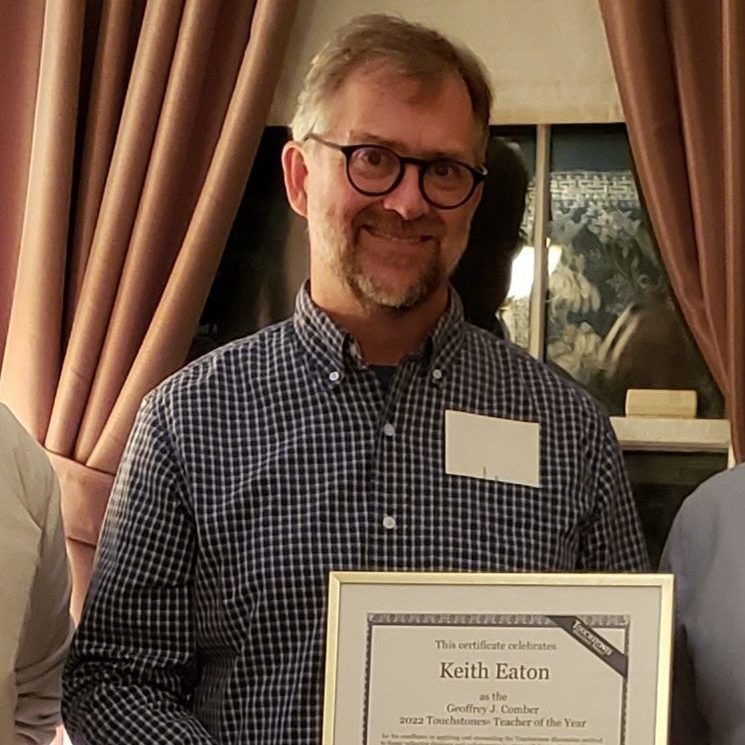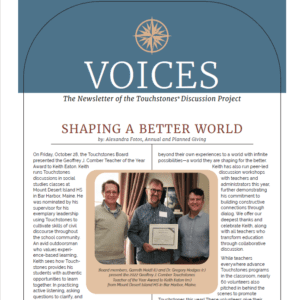By: Lysithia Page, Social Media Manager
Keith Eaton, the 2022 Geoffrey J. Comber Touchstones Teacher of the Year, has taught at Mount Desert Island High School in Bar Harbor, Maine for 11 years. “For Keith, teaching is about developing changemakers,” wrote Julie Keblinsky, who taught alongside Keith for 9 years, in her nomination of him for the award. I spoke with Keith to learn more about his experiences with Touchstones.
Keith: I’ve been teaching high school for 22 years. I’ve been teaching in total for about 26 years in pretty different contexts—you’ll probably discover as we get talking.
Lysithia: How did you become connected with Touchstones originally?
Keith: During the pandemic, I switched departments. I was teaching English Language Arts, and I had to apply to a new position in the Social Studies department. When I was hired—I accepted the position—it was mid-year during the 2020-2021 school year, and the department had already made a commitment to Touchstones. So, when I jumped into teaching World History, I jumped into teaching that program as well.
Lysithia: What was that like as a teacher to take on that pedagogy?
Keith: It was great! It fitted with approaches that I’ve had in the past, and it really fitted with my teaching style and my philosophy of classroom management. I felt very lucky that way.
Lysithia: Can I ask you more about that? How would you say Touchstones connects with your goals as a teacher?
Keith: From the minute I started teaching at the high school level, my philosophy was to have a student-centered classroom where the teacher is part of the conversation and guiding the scholarship or inquiry, rather than being the ‘sage of the stage’ in a sort of teacher-centered model. In that regard, introducing me to Touchstones was like meeting an old friend.
Lysithia: It sounds like you have a pretty deep relationship with discussion-based education. How have you seen yourself as an educator develop through your work with Touchstones?
Keith: One thing Touchstones has allowed me to do more is allow silences and to listen more effectively—to try to hear the struggle behind the actual utterances. There’s always a lot more going on below the surface than what you actually end up hearing. Doing Touchstones also reminds me that the content is not as much ‘the thing’ as the process. That’s an eternal struggle because we’re always so wedded to content.
Lysithia: How has that process influenced your students as they engage with it on a regular, weekly basis?
Keith: We have semester-long classes. Doing Touchstones fastracks the ability to create community and to make a space where it’s safe for everyone to speak. In the past, when we didn’t have a program like this, there were more opportunities for students to remain silent through a semester, and for people to be like, ‘Okay, this is almost over, and then I’m moving on.’
Lysithia: Yeah, what I’ve noticed in my college classes is that, following the pandemic years, people are so much more inclined to recede and ‘clam up.’ Creating community has been very difficult as a result.
Keith: Exactly. Think about some of my students—I teach primarily freshmen. When the pandemic hit, they were in the sixth grade. So, two-thirds of the way through sixth grade, all the way through seventh grade, they were at home—and then they had ‘hybrid’ and other stuff. It really trained them to tune out.
Lysithia: Is Touchstones helping with that?
Keith: Oh yeah! It’s not a panacea—nothing is. But it opens room for people to just talk. During the second quarter of my World History classes, the students are expected to be presenting back to the class with some regularity and with more formal slideshow presentations. I can’t imagine what those presentations would be like if we hadn’t had three months of Touchstones that came before. They’re just much more comfortable in that environment to be speaking to one another.
Lysithia: That’s very interesting that the dialogue dynamic affects your students’ public speaking—not just when they’re seated in the circle, but also when they’re at the front of a room, presenting a slideshow.
Keith: Right! For someone who might be shy or a little more introverted, who has been allowed to be withdrawn, who hasn’t really interacted that much, and who then is thrown to the front of the class—how safe does that feel? It’s hard. I also think that in some environments, for various reasons, they haven’t had the permission to speak, right? And when you’re allowed to do that—speak through your ideas, make mistakes, everything attendant to that—it brings the temperature down and allows you to take more risks.
Lysithia: I think that’s right that people become more courageous when they have practice making mistakes and thinking through their ideas. The stakes are less extreme.
Keith: A lot of silence comes from the fear of being wrong, which is a force I try to push back all the time. I ask leading questions trying to get people to respond, process, think deeply as we go. I’ll ask a question and students will raise their hands, and I’ll say, ‘There’s no hand-raising.’ They’ll kind of chuckle, and I’ll say, ‘No, really!’ And it’s started happening. I really like that. If I blow through a definition really quickly, and I’m checking for understanding, you might have more confidence to say, ‘I don’t understand that one bit.’
Lysithia: Yes! The learning process becomes more self-paced, rather than charging ahead to complete the lesson plan for the day. That’s great.
Keith: And more interactive!
Lysithia: What would you say is your favorite memory with Touchstones?
Keith: Do I have to pick one?
Lysithia: Or multiple! Your choice.
Keith: Last fall, we had a professional group in which we were doing a weekly Touchstones lesson ourselves. When we were in the deep of this pandemic recovery stuff and everything, it was such a brain massage. Another favorite memory would be when we got toward the end of the semester and we were really pressed for time. I came in on a Monday and said, ‘Sorry, guys, we’re not going to do Touchstones today.’ And the class was like, ‘What? Are you kidding?’ This was a group of students who totally did not want it at the outset, and by the end of the semester, were really upset when we couldn’t do a lesson. You know?
Lysithia: Touchstones really grows on people.
Keith: Yes, that’s right.
Lysithia: In the beginning, people are like, ‘We have to sit in a circle and talk about a fairy tale?’ But it feels good to sit and think about one thing for an extended period of time and really just meditate on it with other people.
Keith: It’s almost calming, right?
Lysithia: Yes! It is so calming. What is most important for people to know about Touchstones?
Keith: In our country, we create a space, every afternoon, for students to practice their sport—football, soccer, cross country, everyday. We create space for students to practice biology and math—you know, these very practical, tangible skills. And nowhere in our public discourse is there an ask to practice conversation and dialogue and civil discourse. The assumption is, ‘Oh, it’ll just come naturally to you.’ Really? Do you say that to your basketball team? Like, ‘Yeah, we’re going to play Georgetown Academy, it’s our opening game, just go eat pizza and play video games, it’ll be fine.’ No coach in their right mind would say that. And yet we assume that by going to school, you can be thrown into very complex conversations without having practiced communication skills.
Lysithia: That’s a tragedy when you think about it.
Keith: And even in a prep school that might have a Socratic or dialogic model, communication is not expressly taught the way that a thesis essay might be taught, or how to structure a body paragraph—no one teaches how to speak with another person and how to listen.
Lysithia: I think the amazing thing about Touchstones for me is that people learn how to do those things—or they at least practice those skills—but it’s also not someone standing at the front of the room saying, ‘This is how you listen, this is how you talk with others or express an idea.’ It’s something that people discover on their own while engaging with others.
Keith: Yes! It’s so experiential.
Lysithia: Well, Keith, is there anything else you’d like to share with the world about your experiences with Touchstones?
Keith: Students are finding the opportunity to be listened-to, or to practice speaking out. I don’t see a lot of opportunities for that in other areas. I also think that in a highly tech-heavy world, it can be very easy to feel not listened-to. We should be pretty mindful about creating opportunities for students to be heard in ways that are genuine and authentic, and this is one piece of building a pathway toward that connection.
Lysithia: That was beautifully put. I really agree with that. I think it’s frightening to see such high rates of chronic loneliness these days. I really believe in the mission of Touchstones for that reason, and its relevance in the world that we’re living in today. Thank you for your time today. This was a great conversation.
Keith: Take care!




 Join the
Join the